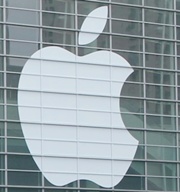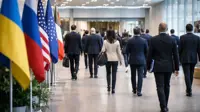Paradise Papers show massive but not illegal tax avoidance by Apple
07 Nov 2017
Tech giant Apple chose the Channel Islands as a new haven to continue avoiding billions in taxes, the Paradise Papers show.
 The company picked Jersey as an alternative after a 2013 crackdown on its controversial tax practices in the Republic of Ireland. Apple reacted to the widespread criticism of its tax affairs by secretly shifting key parts of its empire to Jersey as part of a complex rearrangement that has allowed it to keep an ultra-low tax rate, according to an analysis of the documents.
The company picked Jersey as an alternative after a 2013 crackdown on its controversial tax practices in the Republic of Ireland. Apple reacted to the widespread criticism of its tax affairs by secretly shifting key parts of its empire to Jersey as part of a complex rearrangement that has allowed it to keep an ultra-low tax rate, according to an analysis of the documents.
The move affected two of its most important subsidiaries, one of which is thought to hold the key to a company cash pile worth more than $250 billion.
Apple insists the secretive new structure had not cut its taxes. It told the BBC it remained the world's largest taxpayer, paying about over $35 billion in corporation tax over the past three years and that it had followed the law.
Apple refused to answer detailed questions from the media, but in a statement defended the new arrangements and said they had not decreased the company's tax payment anywhere in the world.
''The debate over Apple's taxes is not about how much we owe but where we owe it. We've paid over $35 billion in corporate income taxes over the past three years, plus billions of dollars more in property tax, payroll tax, sales tax and VAT,'' it said.
''We believe every company has a responsibility to pay the taxes they owe and we're proud of the economic contributions we make to the countries and communities where we do business.''
Over the past three years, Apple has reported paying very low tax rates on its profits outside the US – not much more than previously. The taxes remain significantly lower than required in all the major markets where its phones, iPads and desktop computers are sold – and less than half the rate in Ireland, where the company has many of its subsidiaries.
The Paradise Papers show Apple's two key Irish subsidiaries, Apple Operations International (AOI), believed to hold most of Apple's massive $252 billion overseas cash hoard, and Apple Sales International (ASI), were managed in Jersey from the start of 2015 until early 2016 - enabling Apple to continue avoiding billions in tax around the world.
Apple's 2017 accounts showed they made $44.7 billion outside the US and paid just $1.65 billion in taxes to foreign governments, a rate of around 3.7 per cent - less than a sixth of the average rate of corporation tax in the world.
The Jersey connection has been revealed after Apple's legal advisers, in March 2014, sent a questionnaire to Appleby, a leading offshore finance law firm and source of much of the Paradise Papers leak.
It asked what benefits different offshore jurisdictions - the British Virgin Islands, Bermuda, the Cayman Islands, Mauritius, the Isle of Man, Jersey and Guernsey - could offer Apple.
The revelation is the latest from the Paradise Papers, a huge leak of financial documents that is throwing light on the world of offshore finance.
Though Apple has done nothing illegal, the disclosure is likely to raise fresh questions for the technology company, which has been forced to defend its tax affairs. It may also prompt awkward questions about the nature of the new tax rules introduced by the Irish government and their timing.
Edward Kleinbard, a former corporate lawyer who is a professor of tax law at the University of Southern California, told the International Consortium of Investigative Journalists, which bared the documents, ''US multinational firms are the global grandmasters of tax avoidance schemes that deplete not just US tax collection, but the tax collection of almost every large economy in the world.''
Apple began to consider its options in 2014 following criticism of the way it was doing business through Ireland. A year earlier, a bipartisan US Senate committee had pilloried the company for seeking ''the holy grail of tax avoidance''. It highlighted practices that had saved Apple from paying billions of dollars over decades.
Senators were so infuriated by the arrangements that they accused Apple of exploiting the gap between the two nations' tax laws and creating a ''byzantine tax structure'' that was inexcusable.
The Republican senator John McCain said, ''Apple claims to be the largest US corporate taxpayer, but by sheer size and scale it is also among America's largest tax avoiders.''
The documents in the Paradise Papers show Apple was actively looking for a new home for its key subsidiaries in early 2014. The company had approached Appleby through its US lawyers, who asked Appleby's offices in different offshore jurisdictions to fill out a questionnaire that would highlight the advantages to Apple of moving there.
In a letter from the lawyers on 20 March 2014, Appleby was asked ''to provide assistance with and coordination of a multijurisdictional project involving the British Virgin Islands (BVI), Cayman, Guernsey, Isle of Man and Jersey … if your proposal is cost-effective then we will ask you to handle the entire project.''
Sixty-eight minutes later, a senior Appleby executive sent an email to other partners expressing excitement that Apple had made the approach and encouraging a swift and positive response.
The Paradise Papers show two of Apple's Irish subsidiaries, AOI and ASI, in the process of changing tax residency to Jersey.
Apple refused to discuss the details. But the Guardian understands ASI is now a dormant company.
Apple refused to say where the valuable economic rights once owned by ASI had been moved to but it is understood all its Irish operations are now run through companies tax resident in Ireland.



















